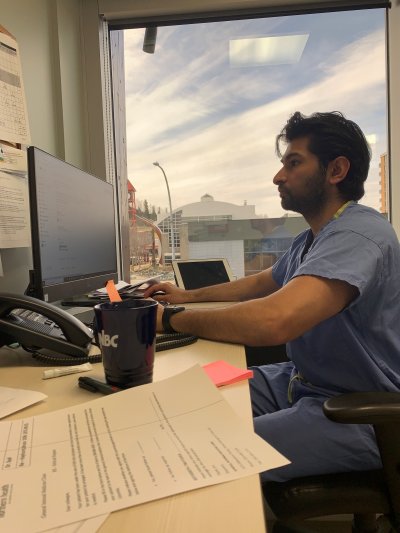In the early days of pandemic, Dr Omesh Syal, a family physician in Prince George, was browsing his Health Data Coalition (HDC) Discover dashboard to gain a higher-level perspective of his practice. HDC Discover allows doctors to better understand their patient populations and compare patterns of practice on a clinic, community, or provincial level.
With Prince George having both a rurally and culturally diverse population, Dr Syal decided to take a look at higher risk patients such as those with diabetes. Type 2 diabetes is the most common form of diabetes (90 per cent of all cases), and some people are at higher risk of developing type 2 diabetes, including those who are overweight and those who are of Aboriginal, Hispanic, Asian, South Asian or African descent.*

Although type 2 diabetes typically occurs in adults, rates among children are rising. According to BC Ministry of Health data, the number of people diagnosed with type 1 or 2 diabetes in Prince George annually is 544. This population group often becomes complex in nature, with associated comorbidities to manage.*
In HDC Discover, Dr Syal noticed that his average HbA1c for his diabetic patients was higher than what he thought it should be. He saw that this was also true in his community. After looking deeper into his EMR data for patients with HbA1Cs over 7, he observed that the patients that had the most challenges with their blood sugar were also patients who needed complex care with other comorbidities, such as coronary artery disease, COPD, and renal failure.
Under BC MSP, physicians are compensated to develop a care plan for their complex patients yearly as needed. Dr Syal normally takes Friday afternoons to catch up on his practice, and promptly worked with his staff to use this time to call in all his complex diabetes patients for a longer consultation on their medications, diet, and exercise. He also asked patients with less well controlled diabetes to check their HbA1C at the lab every 3 months.
"At times it’s difficult to correlate good patient care with compensation, but I was able to find a way to make that work by utilizing HDC Discover. Patients were happy that I was able to spend time with them, and I felt a sense of accomplishment that they were able to take their disease management seriously,” shared Dr Syal.
Dr Syal found it rewarding to spend this time with his complex patients. Even more so, it was great for him to see an immediate and sustained impact on his patients. In HDC Discover, Dr Syal could see that the average Hb1c of his patients immediately began to decline and that levels are now lower and more aligned with his patients’ goals. Using HDC Discover in this way was a rewarding experience that benefited both Dr Syal and his patients.
Source: HDC Discover dashboard, Dr Syal’s diabetes data (click to enlarge)
“After doing the complex care visits for these patients, it was really neat to see the reduction in A1c so easily on the graph in HDC Discover. You could really see the validation in the work that I was doing,” said Dr Syal. His action plan moving forward is to continue having stable patients check their HbA1c every 3 months as appropriate, and to schedule a visit to complete a medication review. He will also have diabetes patients back once a year for a longer, complex care visit. Dr Syal plans to look at his HDC Discover dashboard every quarter to keep an eye on HbA1c trends in his practice - he may now look at other patient groups that fall into the complex care group that would benefit from the additional support, particularly during this challenging time.
“It’s easy to logon to HDC Discover and play around with it. I was able to see so much in regards to my own practice and how I was doing compared to my community as well as the province,” said Dr Syal. “ It really has changed how I conduct quality improvement in my clinic. If I had to say one thing to my colleagues across BC it would be that if you spend a little time doing the work initially, the improvement in patient care and income will happen as well."
In the very near future, the College of Family Physicians of Canada will be implementing new criteria for any continuing professional development activity that falls under the assessment category for Mainpro+ credits. These criteria will encourage the use of tools, such as HDC Discover, which allow physicians to review and reflect on their current state and compare their data with an established standard or norm, such as the latest Diabetes Canada Guidelines.
Learn about HDC and how to enrol.
Watch a recording of HDC’s recent webinar on Diabetes.
*Read more here.

